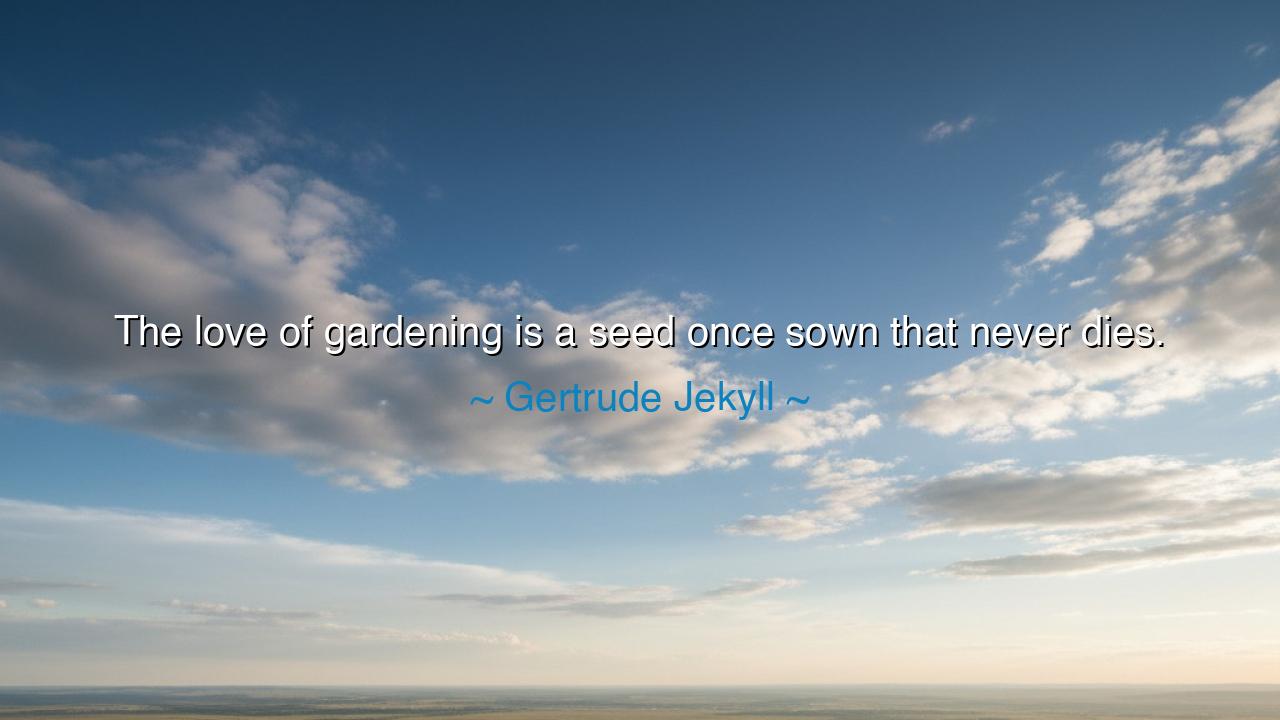
The love of gardening is a seed once sown that never dies.






Hear now, the gentle yet enduring wisdom of Gertrude Jekyll, master of gardens and soul of the English landscape, who said: *“The love of gardening is a *seed once sown that never dies.” These words are not merely about flowers or soil — they are a hymn to the immortal nature of love itself. For in the garden, Jekyll saw a reflection of the human spirit: patient, tender, ever-renewing. She knew that to plant is to hope, to nurture is to believe, and to see beauty in the turning of seasons is to participate in eternity. The love that awakens in the heart of a gardener is no fleeting fancy; it takes root deep within, surviving droughts, storms, and even the long winters of life.
Gertrude Jekyll spoke these words not from theory, but from a life devoted to creation. She was an artist by training, a painter before she was a gardener, but her eyes began to fail her. Rather than despair, she turned her art toward the earth. Her palette became petals; her brush became the spade. In this transformation, she discovered what she called “the joy of the living canvas.” The seed of her love for beauty had been sown long before, and when one door closed, it bloomed anew in the garden. Thus, her quote bears the wisdom of experience: that the true loves of the soul — those that are rooted in creation and care — never die, but simply change their form.
The seed of such love is unlike any other. Once it touches the heart, it germinates quietly, sometimes unseen for years, until the right season awakens it again. A man may leave his garden, wander far, grow old, yet when he sees a blossom or smells the scent of rain upon earth, something within him stirs. The love of gardening, Jekyll tells us, cannot perish because it is not merely affection for plants — it is reverence for life itself. It is a recognition of our kinship with the living world, of our small yet sacred role in tending creation. To lose that would be to forget our place in the great circle of being.
So it was with the Emperor Marcus Aurelius, who, though burdened with empire and war, found solace in the order of nature. In his writings, he spoke often of growth, decay, and renewal — of how all things return to the earth and rise again in new form. Though he ruled armies, he understood the spirit of the gardener: that to care for life is an act of faith, to plant a seed an act of defiance against despair. The same truth flows through Jekyll’s words. The love of the gardener is not idle pleasure — it is devotion, a quiet heroism that endures through time.
There is something eternal in that love because it mirrors the law of nature itself: death gives way to life, and life to death, in endless succession. The garden dies each winter, yet the gardener does not grieve; she trusts in spring. So too does the heart that loves deeply — it learns to trust in renewal. This is why Jekyll’s “seed” never dies. It may rest, it may sleep beneath the frost of years, but when warmth returns — through memory, through touch, through the sight of a single green sprout — it awakens again.
The love of gardening is also the love of patience. In an age that races forward, it teaches us to wait, to tend, to believe in slow miracles. Each seed is a promise whispered to the future. And so, the one who loves to garden learns to live without haste, to see eternity in small beginnings. Jekyll’s words remind us that all true passions in life — whether for art, for learning, or for the earth — are not possessions but seeds. Once planted in the soul, they outlast all seasons.
Therefore, dear listener, take this lesson to heart: when you discover a love that makes you gentle and steadfast — whether it is the care of a garden, the making of beauty, or the pursuit of truth — guard it well, for it is immortal. Nurture it, even when life grows cold, for it will return to warm you when you least expect it. Plant such seeds wherever you go — of kindness, of creativity, of reverence for the living world. For the heart that sows in love will reap joy without end.
And when your own days begin to wane, you will see that your garden — real or symbolic — continues to bloom in others. The flowers you planted will feed bees long after you are gone; the beauty you tended will comfort souls you will never meet. Such is the secret Jekyll shared: the love of gardening is not a pastime — it is a form of immortality. For what is sown in love, dear one, never dies.






AAdministratorAdministrator
Welcome, honored guests. Please leave a comment, we will respond soon